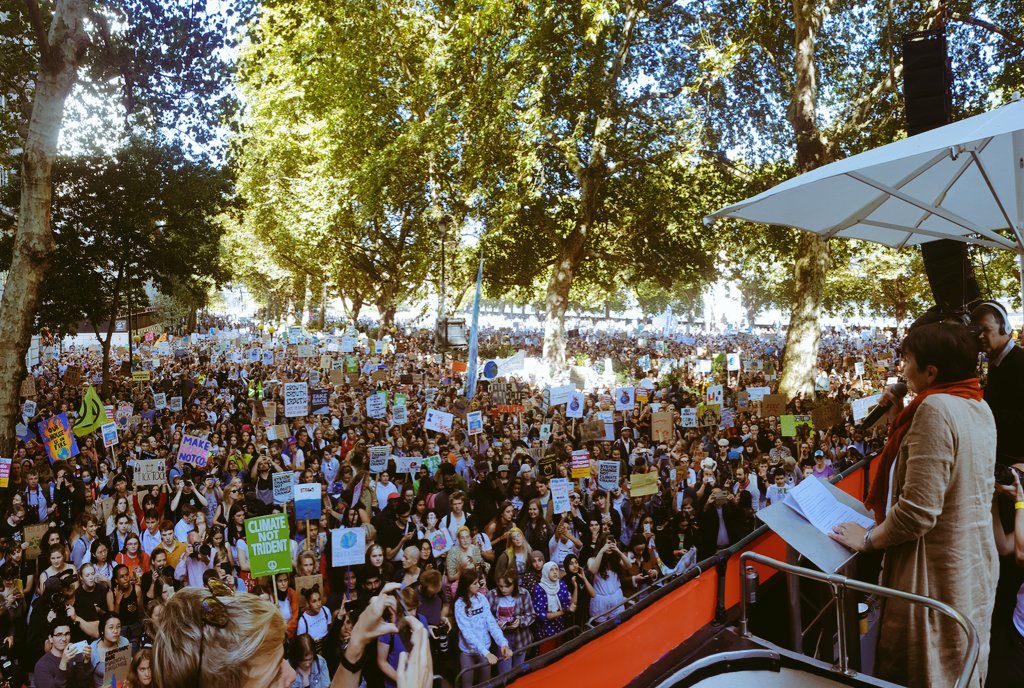Writing in the Guardian, on Friday 20th September, Green MP, Caroline Lucas, explains the Green New Deal Bill, the first attempt to legislate for the Green New Deal in the UK, tabled by Caroline and the Labour MP, Clive Lewis.

It’s been more than 10 years in the making, and is the top demand of the youth strikers gathering on Friday for the UK’s largest ever climate protest – which is why Friday is also the first attempt in Britain to put legislation in place to make a Green New Deal a reality for our country. Working with the Labour MP Clive Lewis, I am launching the full version of a Green New Deal bill (formal title, the decarbonisation and economic strategy bill), which sets out a transformative programme driven by the principles of justice and equity. It aims to move our economy away from its harmful dependence on carbon, at the scale and speed demanded by the science, and to build a society that lives within its ecological limits while reversing social and economic inequality.
Our country needs investment and a worker-led just transition. Too many areas have been all but abandoned by Westminster over the past 30 years: industries shut down with nothing to replace the jobs lost; people ignored and disempowered. I’m struck by the opportunities our country is missing, compared with the bold action taken by others. In Spain, for example, the closure of the coalmines comes with a £221m investment package, agreed with the unions, which includes environmental restoration of mining areas and reskilling of miners for green industries. UK workers want to be part of the sustainability revolution and we are denying them the chance.
So how will our bill help this? First, we need to fundamentally change the way our economy is managed, so that democratically elected governments – not the whims of the market – set our future direction. Freed from false economic constraints that benefit only the wealthy, public investment can go directly into productive activity that will, in turn, generate tax revenue. Our pensions and savings can also be redirected into new green bonds, generating a safe return and the investment needed.
It also means moving away from the pursuit of growth as the primary economic objective. Instead, we should prioritise health and wellbeing, reducing inequality and – crucially – tackling the climate emergency.
The bill proposes a Green New Deal commission, representing all sectors of society and multiple areas of expertise, which will draw up detailed plans. By focusing investment particularly in those areas and communities that have been failed most, and by ensuring that workers are at the forefront of designing a just transition, we’ll have the potential to build a broad and durable coalition that can sustain this transformation.
Government will work with the private sector to invest in the innovative work required to transform everything from manufacturing to the way we produce and consume energy, heat our homes, travel and grow food. This investment will create well-paid jobs and new industries across the country, producing tax revenues for the government.
The bill sets out yearly targets on emissions, inequality and wellbeing. In a report to accompany the bill, our advocacy organisation Green New Deal Group proposes investing up to 5% of annual GDP, around £100bn annually, for the next 10 years. The shortage of “shovel-ready” projects means it may not be possible to spend those sums immediately. But what matters most is what we do in the near future: we need to invest in the infrastructure that will allow us to live within our ecological limits and take us towards the government’s declared goal of net-zero emissions – and well before 2050, which is far too late. And as Lord Deben, chair of the Committee on Climate Change, has said, the sooner we do it, the cheaper it will be.Advertisement
This is not just about decarbonising our industry and transport systems with investment in railways and emissions-free bus travel. It is also about transforming our farming, and restoring soil health and biodiversity by directing subsidies towards farming methods that support this.
But it is also, crucially, about redistributing power in our country. We are one of the most centralised states in the western world, with power concentrated overwhelmingly in Westminster and, increasingly, Downing Street. Although the Green New Deal must be driven by national government, the details of the plans will be devised and implemented locally. Local authorities are best placed to develop detailed plans with the communities they represent.
It must be about international fairness too, and the bill accounts for this by ensuring finance and technology for the global south.
The years I have spent discussing the Green New Deal with economists and environmentalists have often felt like wasted years. The climate crisis has grown rapidly worse and biodiversity loss is accelerating. But the upsurge in support for climate action, particularly among young people, has been inspiring.
An overwhelming majority of the public think the climate emergency is the most important issue we face. Politicians need to respond: there is no time to waste and a nation to transform.
Ask your MP to sign EDM #2724, Green New Deal Bill
The Decarbonisation and Economic Strategy Bill
Caroline Lucas and Clive Lewis MP are seeking feedback on ways to improve the Green New Deal Bill before it is re-introduced in the next parliamentary session – please email with your suggestions.
A report, The Green New Deal: A Bill to make it happen, by the Green New Deal Group – of which the MP Caroline Lucas is a member – accompanies the publication of the Bill.
Join the movement for a Green New Deal – Green New Deal UK
